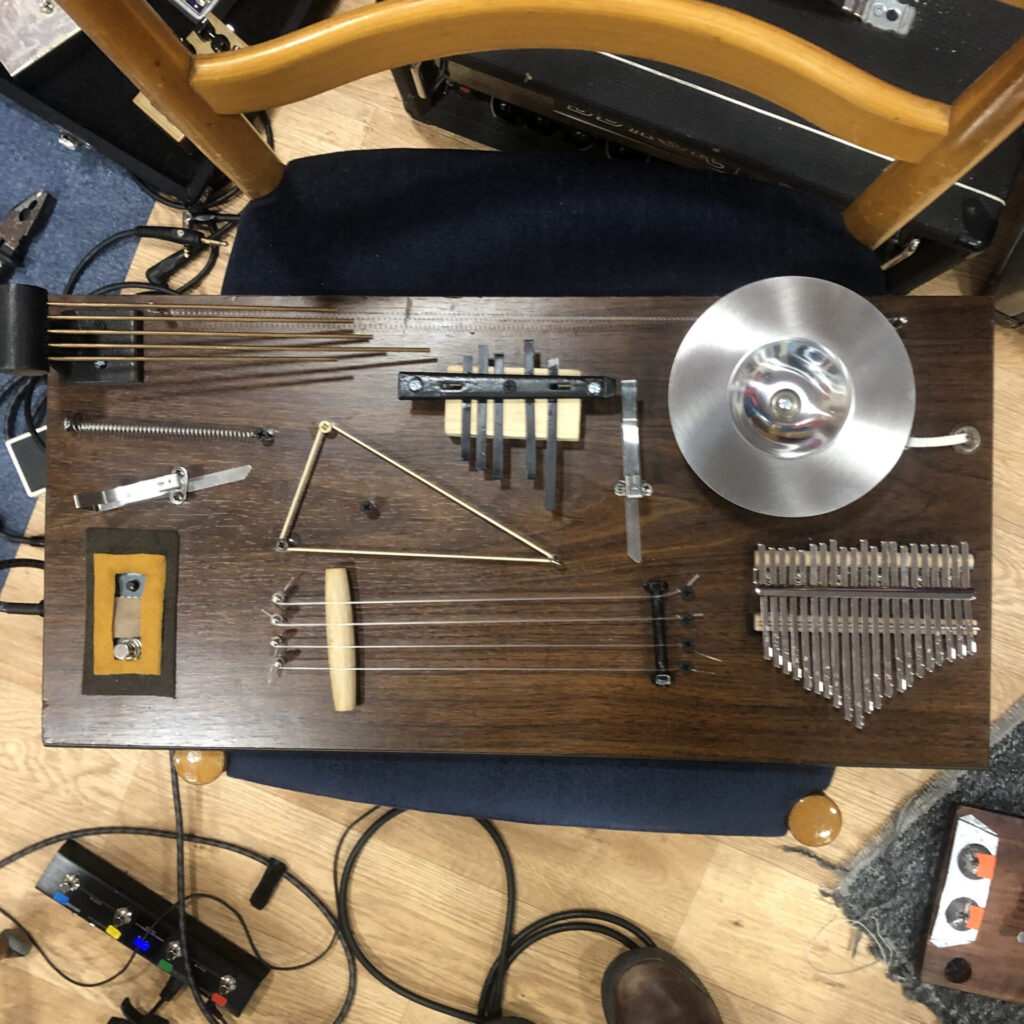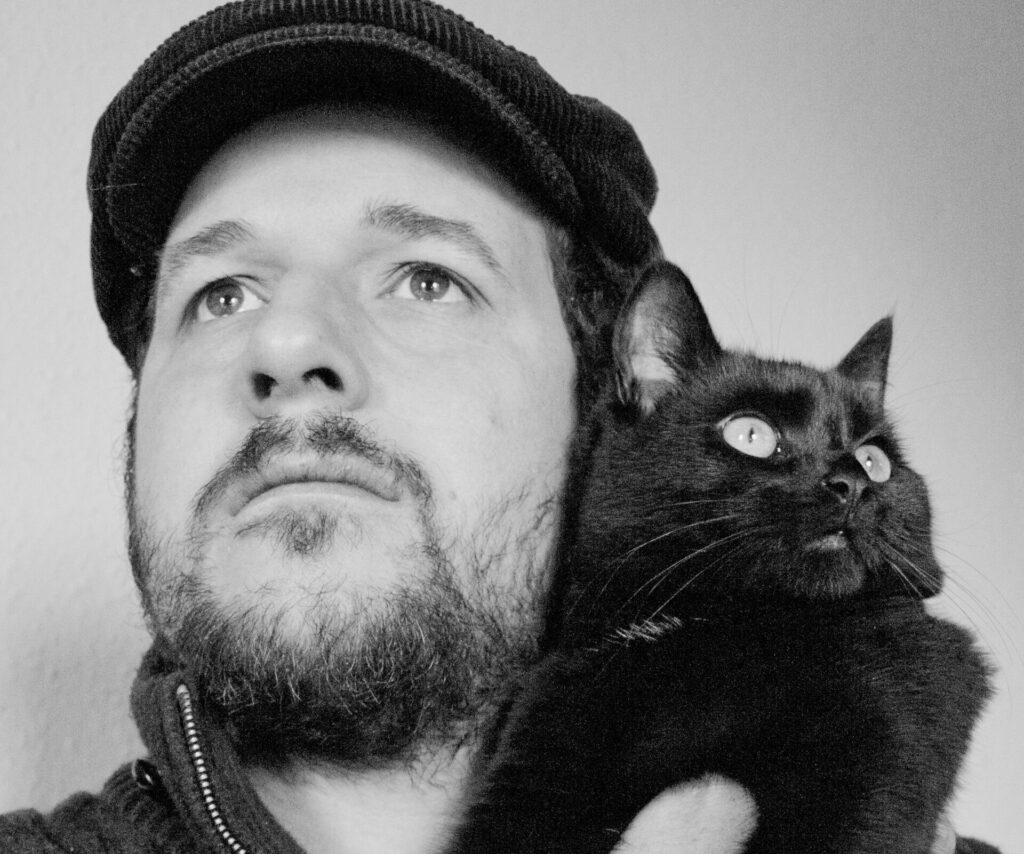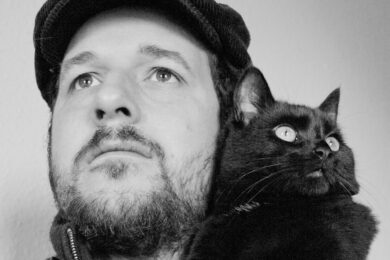When Andy Abbott was asked to play music outside his local care home during the pandemic, he was quick to say yes. It was the summer of 2020 and, as with the rest of the country, there was an urgency to the situation in West Yorkshire as the crisis began to peak. By mid-June of that year more than 16,000 UK care home residents had died from confirmed or suspected Covid-19. And for South Square Centre – an arts and community hub based in Thornton, Bradford – their attention was focused on those most at risk of isolation in the village, a subsection of the community that included the elderly.
That afternoon, Abbott stood on the lawn with his guitar, and the conservatory doors were open. “I thought, well, I’m not going to write a set to be played to older people, I’ll just play what I normally would at a gig.” So he did. Not a Cliff Richard style singalong but a performance of his own acoustic compositions – spectral and woozy soundscapes inspired by the “derelict hinterlands” of Bradford where he lives, and with more than a nod to the American primitivism of John Fahey; hypnotic undulations which may, or may not, have garnered him new fans in the care home that day. Although obviously, that was hardly the point. “We weren’t selling much merch,” he laughs. “I like the idea of something happening in a place where it doesn’t normally,” he later muses. For Abbott, it’s all about “the cracks” and “the gaps” in his line of work. “Moments of rupture” where meaningful connections, such as this one, can occur.
“Maybe that’s why I like the DIY music scene,” Abbott ponders on a video call from his home in West Yorkshire. For a long time, the baritone guitarist was primarily associated with the more raucous sounds of noise rock duo That Fucking Tank and the double-drumming psych outfit Nope. But in recent years, under his solo moniker ADRA, he has been venturing into more ambient and minimalist waters, guided also by his work as an interdisciplinary artist on a variety of socially engaged projects in his local community – creative initiatives that include the one that led him to the record he’s about to release.
Abbott will be the first to tell you that his new album, Music For Psychiatric Wards And Fluid Structures, is a different undertaking in both approach and scope. For starters, it came to fruition in the psychiatric wards in which he played music as part of an NHS pilot scheme delivered by Everybody Arts and Creative Minds, that he took up after his work at the care home. His role was officially billed as ‘creative practitioner’ – although Abbott likens it more to an artist in residence, akin to a busker in the ward. “I’d never worked in a health setting before but towards the end of my dad’s life he had suffered a head injury, and had dementia, in a similar unit in Derbyshire,” Abbott shares – a personal tie to the ‘residency’ that undoubtedly brought back memories when he first turned up with his “bag of tricks” – a baritone, a few handmade kalimbas, a mbira ( thumb piano) and some loop pedals – and played for six hours straight. From there he designed what he calls an ‘ambient accessible music board’ which looks a lot like a bagatelle table game with its chimes, rubber bands, and springs. What has evolved through his three months of performance and experimentation – and the invention of this instrument – is a genre-defying album that is as fluid as its title would suggest. From the patter of the steel pan to the whirr and drone of the organ, what unfurls in between these two harbours is a deeply searching travelogue; at times water-like, at others light-filled as if in some kind of morning glow.

I can’t help but think that its fluidity has a lot to do with the psychiatric space in which Abbott found himself as a musician, submitting to an environment that was ever changeable from day to day. “Yes, I think there was an aspiration to create a fluid structure in that space, too,” he nods. Music in institutional care settings can often be rooted in nostalgia, brought in to soothe and pacify, which certainly has its place, Abbott says, but he wanted to try a different approach. “As an artist you get given a certain amount of leniency to try different things.” He’s not a music therapist, he tells me – nor would he try to be. “But having someone with a different perspective can be useful to test the parameters.” And test the parameters he did. Abbott wasn’t thinking about music as a way to jog memory, necessarily. “I was more interested in soundtracking the ward itself, trying to create a type of atmosphere in there.” Sometimes he would provide a live soundtrack to archive film footage as a way to engage with those who may have felt that this kind of music-making wasn’t for them. He left instruments around as a “soft invitation” to join in. “Sometimes that resulted in full jams with all the service users and their support workers, a mini rave type of atmosphere.” Sometimes those same service users would simply fall asleep, lulled by the music he was playing. “It was good to go in there without any expectations,” he smiles.
The key NHS measurement of success during the residency was the reduction of violent incidents, Abbott tells me – which, interestingly, his music achieved. “But in a way, this freed things up.” He found that supplying the ward with his own handmade instruments took away any preconceived ideas about what music-making was all about. Take many of the men on the over-65s ward, for instance, initially reticent to engage, but immediately piqued when he brought in a handmade cigar box guitar fashioned out of an old tin of Heinz pickled onions. “If I left them lying around while I was playing, those men would pick them up and want to talk about how they were made.” More often than not, they would start playing them, and before too long they’d be making music together.
Schemes like this are a good way to democratise ambient and experimental music, Abbott contends. “A lot of the time people find it obtuse or too abstract – or nice music, but they don’t know why it exists.” And yet hand these people a tin can to play and it gives it a more “utilitarian” vibe, “shifting perceptions of what music is and who it’s there for.” It’s something he saw in action six years ago when he worked with the Argentine musician Anla Courtis, who, alongside founding the cult 1990s group Reynols (and recruiting its drummer and frontman, Miguel Tomasín, who has Down Syndrome), currently works as a music professor for disabled people at the Fundacion Artistas Discapacitados (Disabled Artists Foundation). “I did a three day workshop with him and Pyramid Of Arts [a Leeds-based arts collective and charity providing arts access to people with a learning disability] and the workshops he ran with people who had fairly profound learning disabilities was really out there, putting a lot of trust in the participants.” Abbott and Courtis decided to make music based on what each participant brought to the project – as opposed to trying to shape it themselves “into something that we might call music.” It was a turning point for Abbott: “The outcome was an incredible 45 minute set of very avant-garde music and it really changed my opinion on what was possible in that situation.”
Again, it comes back to this idea about what music is and who it’s there for. By asking himself these questions, Abbott’s compositions have converged differently this time, into an album, he suggests, that is his most “coherent” to date. “Maybe I was less self aware,” he muses on the music that has come out of this very unique set of circumstances. “There’s definitely a lot more melody and nicer moments in it then maybe I’ve done in the past because I’m not overthinking what it’s for.” The ward didn’t just change his playing, he tells me, it changed his approach to composing itself. “I found the whole experience very rewarding and energising,” he says. As to what’s next: “I’d love to do more.”
Music For Psychiatric Wards And Fluid Structures is released on 1 November



